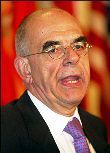UN urges quick start for Darfur monitoring force
 BRUSSELS, Sept 29 (Reuters) – The U.N. special envoy to Sudan urged African states on Wednesday to speed up moves to send a large force to Darfur and called on the West to back their efforts with generous logistical support.
BRUSSELS, Sept 29 (Reuters) – The U.N. special envoy to Sudan urged African states on Wednesday to speed up moves to send a large force to Darfur and called on the West to back their efforts with generous logistical support.
Jan Pronk said he feared that a monitoring force to be sent by the African Union (AU) in the western Sudanese region where fighting has killed up to 50,000 people and forced 1.5 million more to flee, might arrive too late and with too few resources.
“That has to be changed into a quick process, broader mandate and bigger force,” Pronk told reporters after talks in Brussels with European Union foreign policy chief Javier Solana.
“My request is, please understand we need a big force,” he said, calling for a start to operations in October if possible.
The United Nations has described the situation in Darfur as the world’s worst humanitarian crisis.
The AU is mandated by the U.N. Security Council to send a force and is due to decide early next month if it can gather the necessary 3,000-5,000 troops.
Pronk, who will present the Security Council with an update on the Darfur crisis for discussion next week, said the EU and NATO could help by providing much needed support to the force.
“The Africans are able to do the job,” he said. “What we need is planes, fuel, cars, all types of logistical support that is available in Europe and NATO.”
NATO has sent a delegation to the United Nations to see what contribution it could make in the event of an AU deployment. In addition to logistical support, the EU has said it could provide a small police force if compatible with the AU’s mandate.
The U.N. Security Council adopted this month a resolution threatening Sudan with oil sanctions if it did not stop atrocities in the Darfur region where Arab militias are terrorizing African villagers.
Rebels began an uprising in Darfur in February 2003 after years of skirmishes between mainly African farmers and Arab nomads over land and water.
The government admits arming some militias to fight the rebels, but denies any links to the Janjaweed Arab militias.
